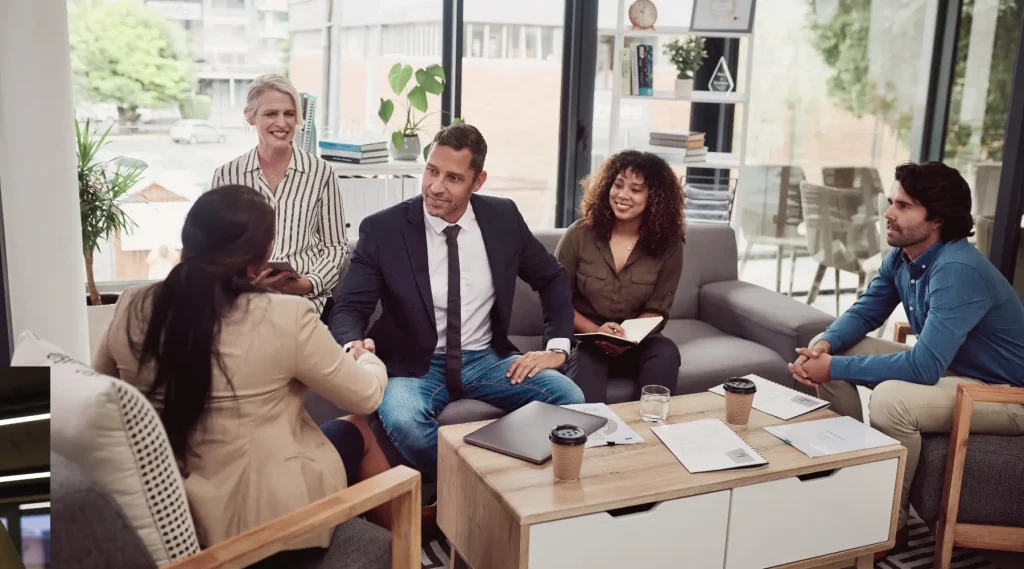Imagine you’re playing table tennis. But not only with one person, but playing table tennis with six opponents at the same time!
It’s a bit like that in the panel interview. As preparation, the only thing that helps is to have as much practice as possible in the question-and-answer game with different people. The rest depends on the situation and your shape on the day.
Let’s take a closer look at the subject, I’m sure we’ll scare away that goofy feeling in our guts. ok?
What is a panel interview?
A panel interview is first of all a normal interview and part of the regular selection process. You have applied for a job and now you have been invited.
Now, interviews can differ in terms of how many people you meet during the interview.
If there are several, i.e. more than two, then it is called a group interview or a panel interview. But often it’s so normal for a company that they won’t even tell you beforehand.
A panel is like a committee, which is a group of experts formed to perform a specific task. In Latin, the meaning is „womb, innermost“.
As such, the panel interview is an interview where a group of relevant and „innermost“ people within the potential employer’s company set up to choose which applicant gets the job.
In academics, the panel interview has a long story. Just think of the defenses of theses and doctoral dissertations. The same applies when you apply for jobs at a Lehrstuhl at a university.
What makes organizations decide to do a panel interview?
The interviewers are representative of different functions in the company.
This can include the department head, employees from related departments or from the direct team, supervisors, and even owners. In Germany, larger companies often bring in a member of the Works Council or the Equal Opportunity Officer.
Reason #1: A group interview may save time
From this selection, you can see that a group interview is a time saver in complex organizations. The decision for a candidate is never a matter of the HR or recruiter alone, but people of different functions have to give their ok. If they’re all in the interview, they can come to a quick decision right afterward.
Otherwise, HR usually faces the problem of a key player in the hiring process is on vacation or on a business trip. And as a result, the process drags on for an unnecessarily long time.
Reason #2: Regulatory requirements must be met
The works council and/or the equal opportunity representative are often involved in larger organizations or authorities. You may know this from the interview process at a German university.
Reason #3: To speed up the final decision
In many cases, a panel interview is carried out as part of a multi-stage interview process. Initial and second interviews are held on an individual basis, and once two or three candidates have been shortlisted, a panel interview is held to finalize the decision.
Reasons #4: To increase the acceptance of the new person

When filling a management position, a company wants to make sure that all-important representatives support the decision. Then no one can withhold their support, or complain after the fact that it was the wrong person.
Similarly, it is often the case with positions where many wires come together. As an example, this could be a project position or a position that is supposed to network. Or it’s a collaborative position where the candidate will be working with several partly external fixed partners. In this case, the representative of an external organization may even be present at the group interview.
Reason #5: When expert knowledge is required
This is often the case at universities, too. The main focus here is on expert knowledge combined with communication. For this, following the first successful individual interview, an applicant receives the task of preparing a technical presentation followed by a discussion with the plenum.
Getting to know your new colleague in this way is so much more intense and personal than an interview, one that is standardized after all. Everyone involved gets an idea of what it will be like to work together. This also goes for the applicant him/herself, after all: If he or she does NOT feel comfortable in the plenum, this is a red flag.
Reason #6: If a special personality is sought
For some jobs, the applicant’s personality is crucial to success. This can be because it is a sales position where not only negotiation skills are necessary, but the applicant must remain calm even if the negotiation becomes really hot or personally demanding.
Or for the position are leaderships skills wanted. Then the panel is a great way to test the applicant’s ability to deal with a bunch of people, maybe even putting some pressure on the candidate by digging deeper with the questions or be more offensive in the questioning.
Now, the panel interview has the advantage for the company searching for a candidate with best coping skills. Several people can now concentrate on observing exactly how the applicant behaves. For example, the facial expressions or tone of voice when stressful questions are thrown at him or her. This makes it easier to assess how the applicant will behave in real life.
What makes a panel interview so challenging?

Let’s take table tennis again as a comparison. I myself don’t play table tennis that often and I’m not used to the speed of the ball.
When you do your first interviews, with practice you will get used to the challenges of this particular situation. And get better and better.
It’s the same when you have several interviewers sitting across from you.
From my point of view, the situation itself is the biggest challenge. That’s because you have several people sitting across from you, and they’re looking at you. I mean, they’re just looking at you, assessing you. They don’t smile. Probably they’re taking notes, with you not knowing exactly what they’re writing there.
Even a routine person in terms of communication can feel a little unsettled here. At times even a bit panicky.
In terms of content, however, the interview won’t be much different than a normal one-to-one interview.
Except… one aspect.
This is what I mean: Imagine you’re facing someone from the Marketing department, the other from Finance, and the third from Engineering.
Each of these people will review you and your resume from different angles. After all, everyone pays attention to different details. The HR person asks different questions than the marketing person, and a controller has completely different aspects that he or she finds important. They will also evaluate your answers from different angles.
Still, there’s a lot you can do to prepare 💪
Join my German Business Culture – Insights
Get the latest news, updates and releases.
Please check the data-privacy for further details about the newsletter.
How do you best prepare for a panel interview?
Prepare as you would for a regular interview.
This also includes such typical organizational questions as, for example, whether the travel expenses for the journey have been clarified.
Once you have done your homework, you can go into the interview with maximum confidence.
Prepare the most important questions:
- Knowing the job description, with the tasks and requirements in detail.
- Thinking through the most common questions and answers related to this position, and
- taking rough notes on the answers (English and German, depending on what is relevant for you)
- get well informed about the company beforehand
- make notes on what your particular strengths are and why you are best suited for the position
If things go well, your HR contact will have told you before the interview who will be in the interview. Getting the name and function is perfect.
You can then mentally tune into what responsibilities they have in the company and what is presumably of importance to them about an applicant.
TIPP
Write down the names and functions of the people involved on a sheet of paper or your notebook (handwriting), take it with you to the interview und put it on the table directly when you arrive.
The conversation culture
Focus more on a conversation than on questioning
Now that’s easier said than done.
It’s important for you to know that an interview doesn’t have to be like a question-and-answer quiz at all.
It can be more of a talking-to-each-other conversation. This is so much more relaxed and pleasant for both sides.
I hear this quite often from clients who are surprised at how unagitated job interviews can be.
And, this style corresponds much more to the German-language culture.
Still, it doesn’t necessarily mean that the interview will be a success simply because it was such a pleasant talk. After the interview, you need to analyze carefully how you’ve performed, what you’ve learned, and how the others reacted to your answers and explanations. I’ve created an analysis sheet after the interview, it’s free to download.
However, a rather relaxed conversational atmosphere is not easy to achieve in a panel interview. Presumably, each of the participants has noted down a few questions that have to be worked through one after the other.
KEEP IN MIND
Even if the conversation is really relaxed and it feels really nice, it’s still an interview. You are being watched very closely. Every sentence you say will be weighed in the balance. Don’t get lulled into making careless or too spontaneous statements that don’t match your positioning.
Refer to the statements of the persons you talk to
Try to make the interview situation a little more fluent.
To do this, you consider what another interviewer has asked you. Or what you’ve said before and want to pick up on now.
For example, it might sound like this:
„As Frau Müller mentioned, it’s very important to involve the team before purchasing new technology,“ or
„As we agreed before, XY is crucial for project planning.“
This way, you’ll be able to relate to others in the conversation. By bringing them in, the conversation will be smoother and more pleasant for everyone. And quite simply, you also demonstrate you can listen and summarize statements. But in a panel situation, that’s a fine art😅.
Eye contact
In Western or German culture, eye contact is a sign of respect.
Those who look others in the eye have advantages: Direct eye contact can signal an agreement and avoid misunderstandings.
Myself, I know that I appreciate it when others look at me with an open mind. It’s not about staring, but a friendly look in the eye. As we say, having an eye-to-eye conversation. Just that in the panel interview, it’s not just one person who wants to feel personally appreciated but several.
Customize responses to single interviewers
Above I already mentioned that a marketing manager will have completely different questions for you than the financial expert.
Or your ( maybe) future line manager, who wants to learn not only about your technical knowledge. He or she will also want to understand what expectations you have of the team and his or her leadership.
Practice taking Interviews
In fact, the best preparation is practice. Be happy about every interview you have given. With each interview, you will involuntarily learn to be more responsive and develop more and more understanding of what questions you will be asked and what answers will be well received.
For a panel situation, you can take the exercise one step further: Ask a few friends to be your interviewer panel. It helps tremendously just to be able to sit across from a panel of people. Make a game of asking and answering. You’ll notice that your stress level will drop to a more tolerable level very quickly.
I wish you much success!
Nicola



Schreiben Sie einen Kommentar